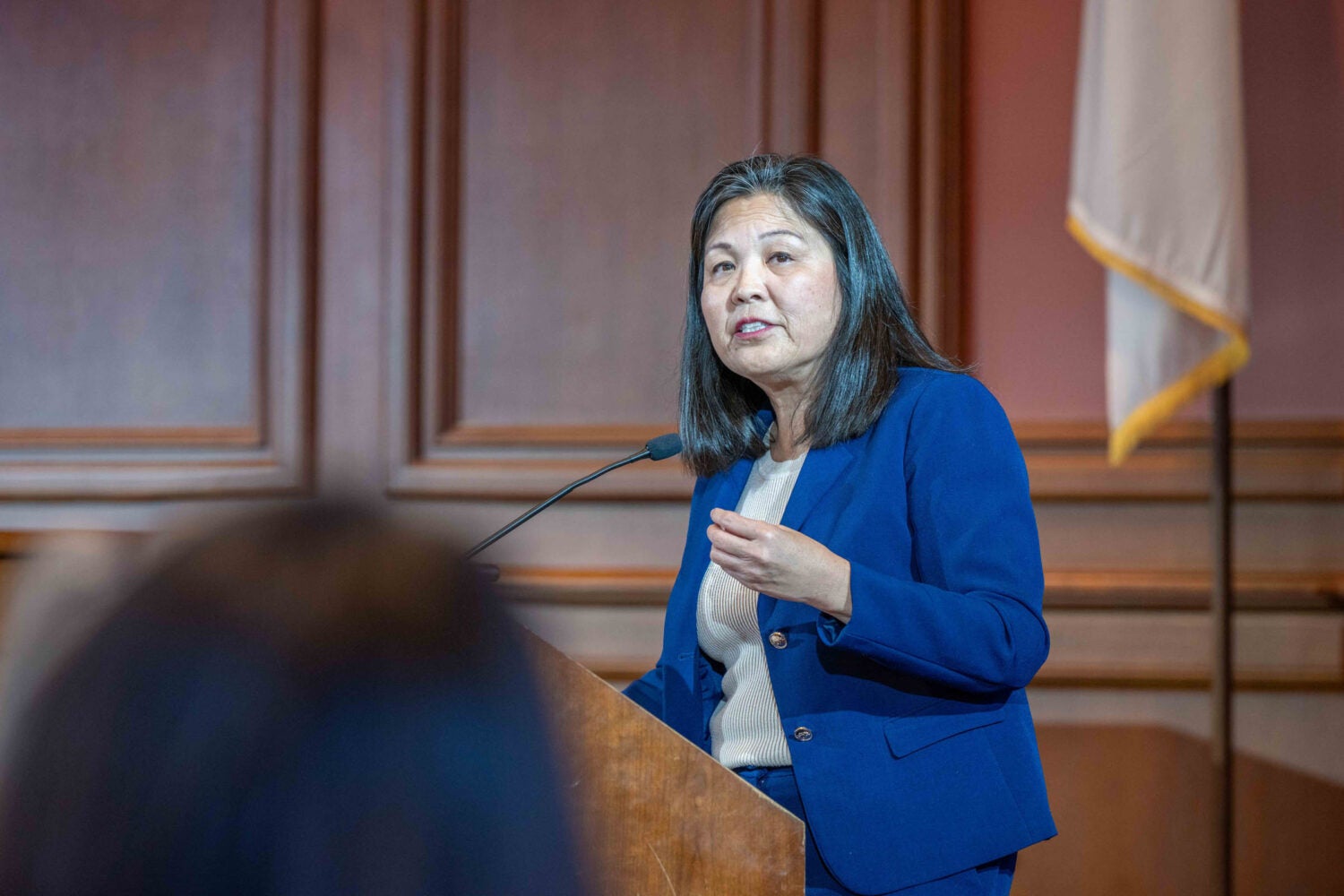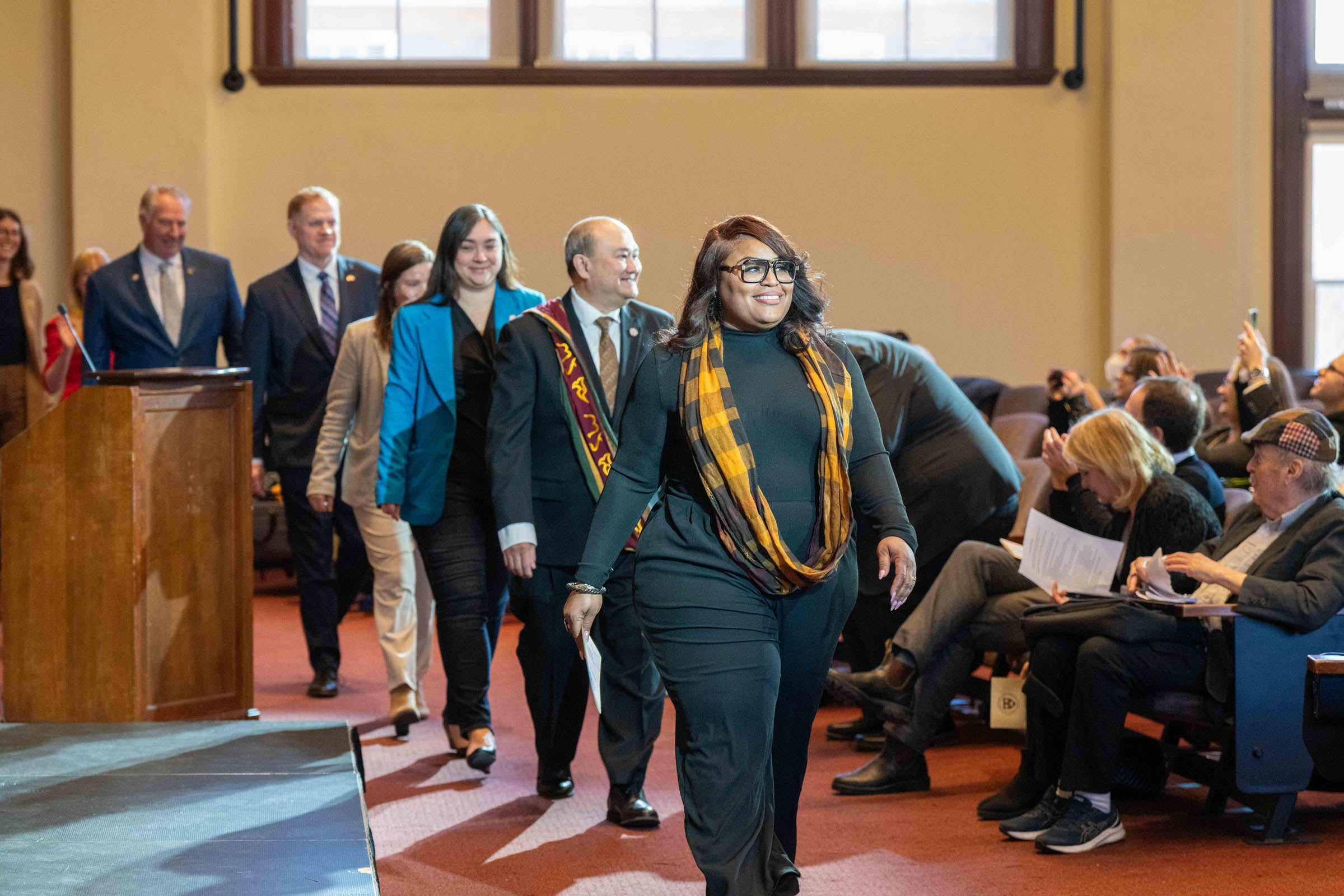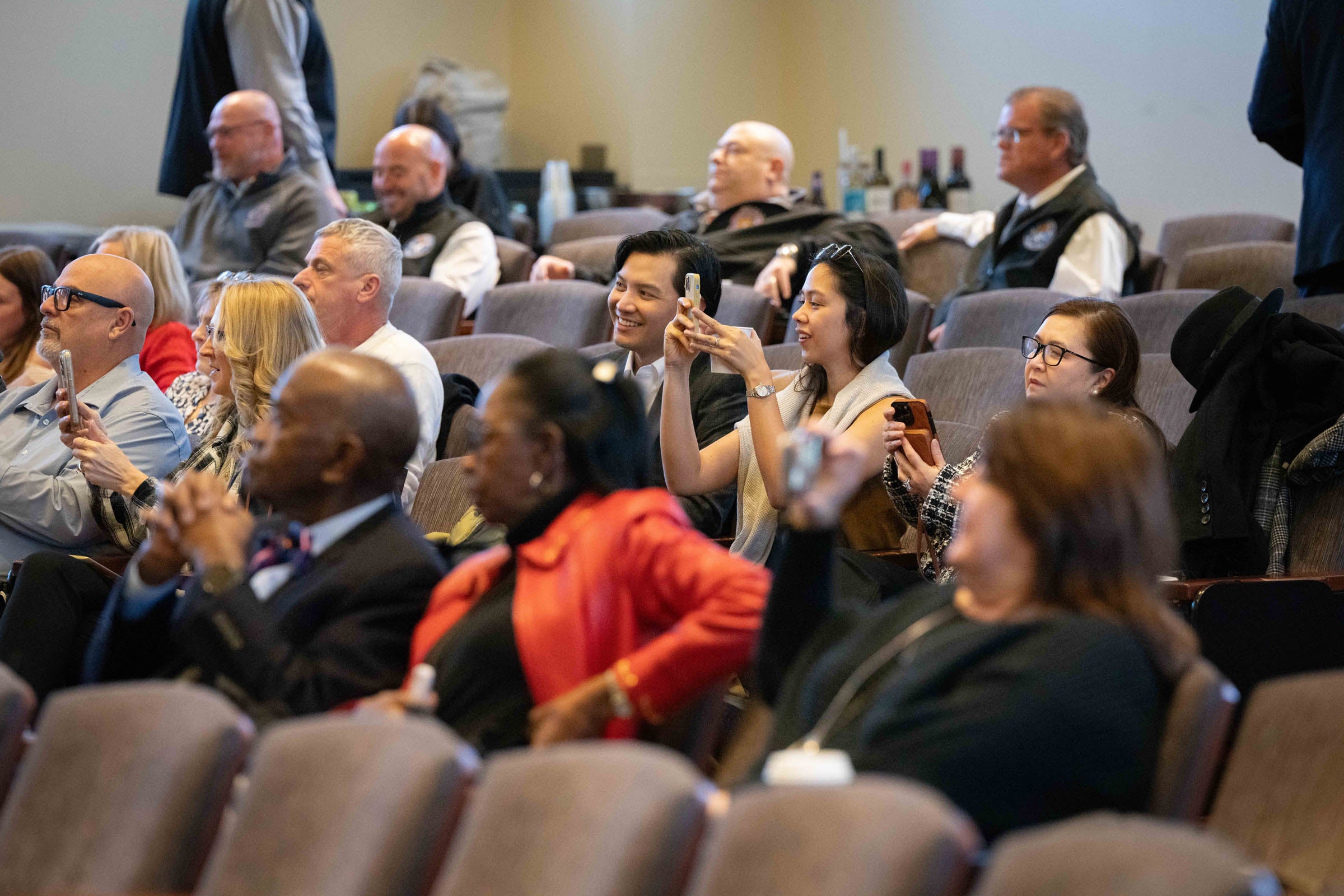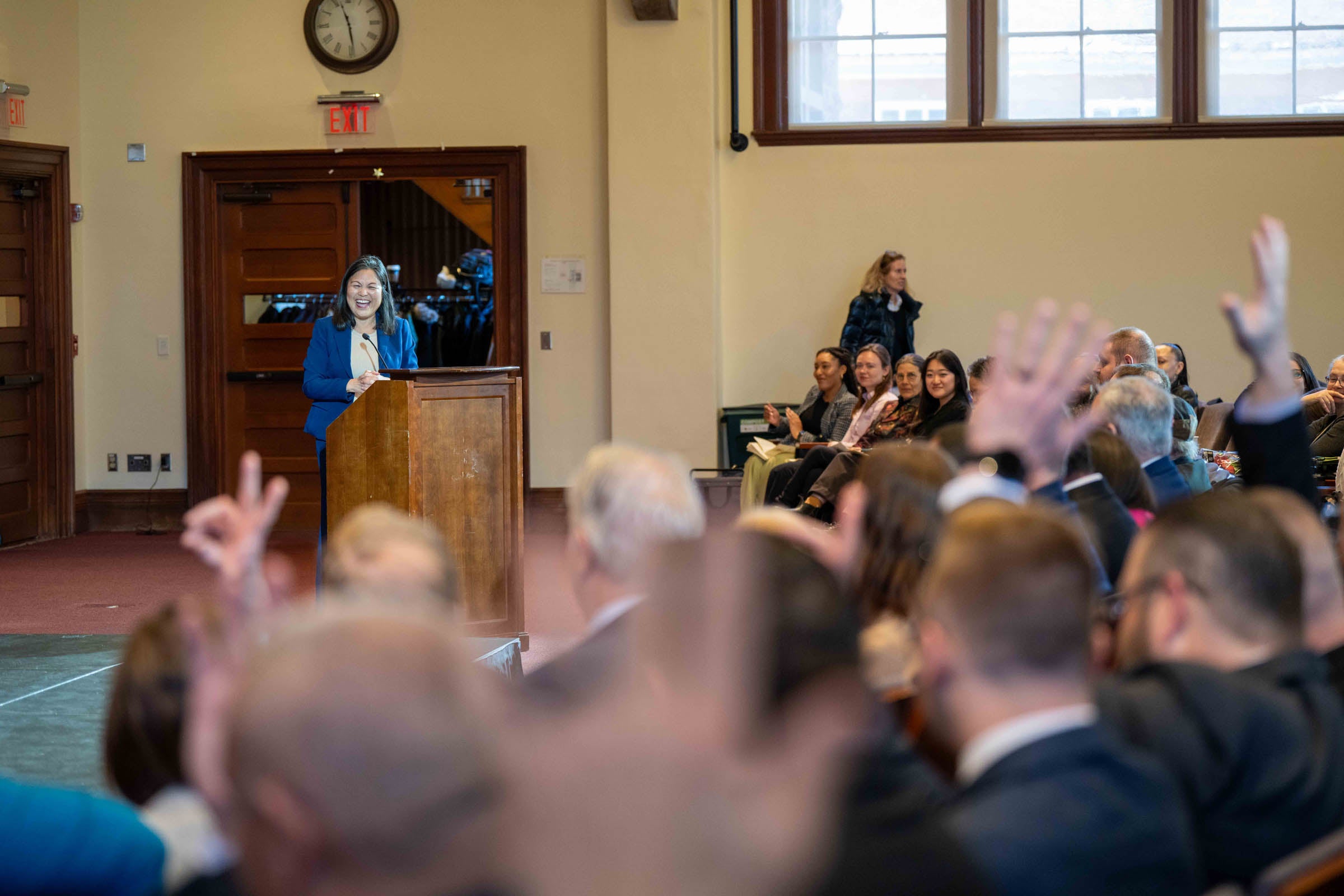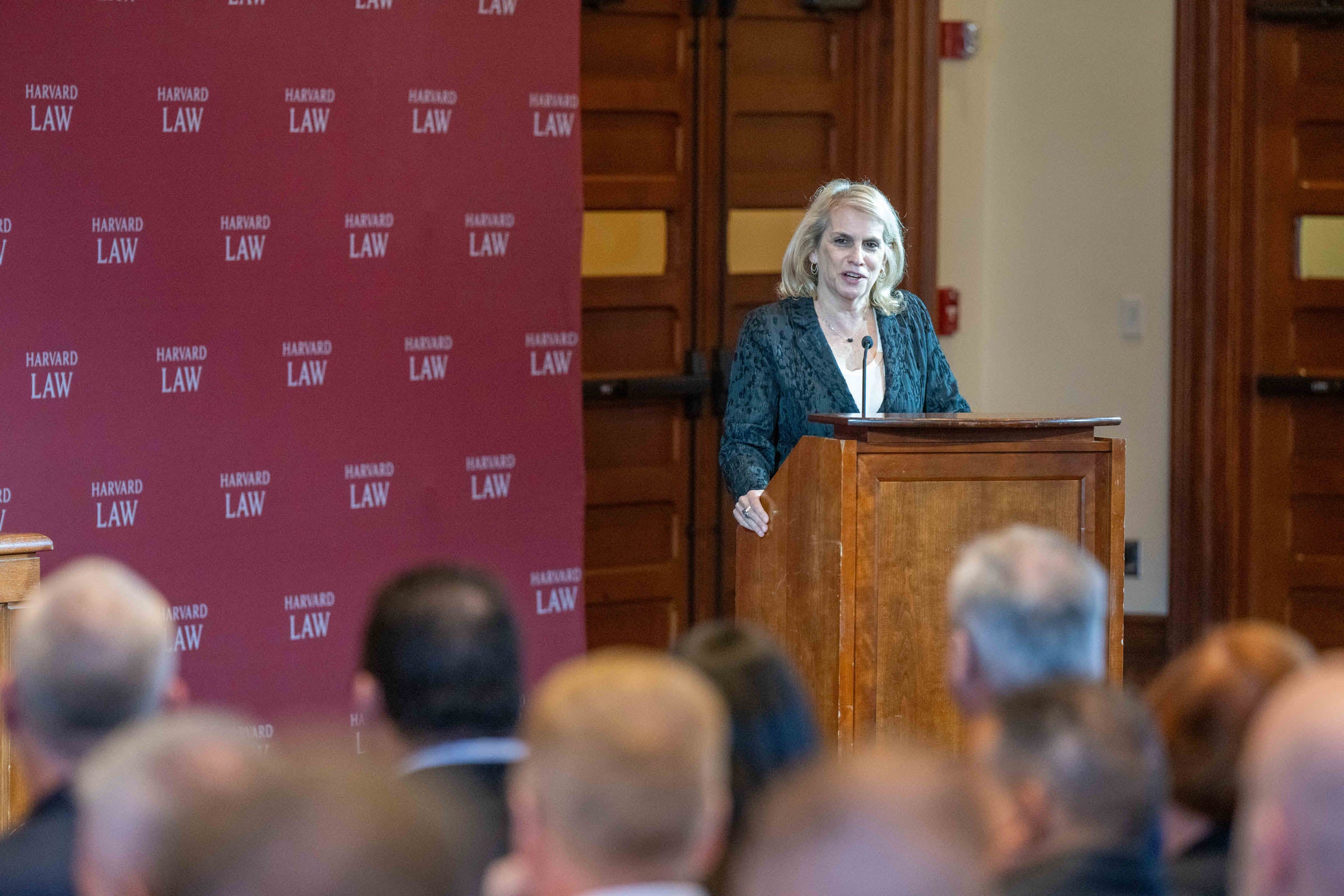In four years at the U.S. Department of Labor under President Biden, including two as acting secretary of labor, Julie Su ’94 helped to implement the bipartisan Infrastructure Investment and Jobs Act, extend overtime pay for salaried workers, and facilitate agreements between employers and unions for autoworkers, longshoremen, school bus manufacturers, and airplane machinists.
In those contract negotiations, Su, a labor rights activist, often heard from employers that the wage increases demanded by workers were too high because they were “above the market wage.” She pushed back on that premise, she explained in remarks at the Feb. 14 graduation of the Harvard Trade Union Program (HTUP).
“Instead of telling workers that their demands are too high, maybe it’s time we start to question why the market wage is so low,” said Su, who also spent two years as the department’s top deputy. “Why is it that working people have to work full-time, year-round, and sometimes multiple jobs and still can’t afford to live near where they work?”
With every contract gain, unions help to make the case for higher wages, she told the more than 40 labor leader graduates, their families, friends, colleagues, and faculty and staff of the program.
“The thing that’s so amazing about unions and union contracts is that you are helping to lift up that market wage,” said Su, who left the department at the end of the Biden administration. “Through your contracts, you not only make wages better for your members, you lift up wages in entire industries, and I think that is remarkable and that is worth celebrating.”
For more than 80 years, the five-week residential Trade Union Program has trained union activists on negotiations, legal and economic issues, community relations, capacity building, and other relevant leadership skills. The program is part of Harvard Law School’s Center for Labor and a Just Economy, which is led by executive director Sharon Block, who held labor roles during the Obama and Biden presidencies, and faculty co-directors Richard B. Freeman, an influential labor economist, and Benjamin I. Sachs, former assistant general counsel for the Service Employees International Union.
Members of this year’s class, the 112th since the program’s founding, came from the United States, the United Kingdom, Canada, and Australia and represented industries ranging from electrical workers to health care. In addition to tackling their rigorous coursework, the participants heard from two Nobel Prize winners: economists Claudia Goldin and Daron Acemoglu.
Su has spent her career advocating for workers. In 2001, she won a MacArthur Foundation fellowship for her work on a landmark federal lawsuit that expanded liability for labor violations to the top of the fashion industry’s supply chain and ultimately led to immigration protections for undocumented workers who expose their employers’ criminal behavior. She also worked for many years in California state government, including as the state secretary of labor and as labor commissioner.
Su announced earlier this month that she had accepted a position at the Century Foundation, a progressive think tank, to protect labor rights, grow worker power, and advance equity in the economy.
During a conversation in advance of the graduation ceremony, Su said labor laws “have not kept pace with the needs of America’s workers.”
“Through your contracts, [unions] not only make wages better for your members, you lift up wages in entire industries, and I think that is remarkable and that is worth celebrating.”
Julie Su ’94
“The minimum wage has not increased in decades. We are the only country of our economic status that does not have a national paid-leave program. Laws have not kept up with the union-busting activities that are all too common — the practices that have grown over the last few decades that corporations use to try to distance themselves from the workers who make their profits possible.”
The graduates also heard from Block and Freeman, who, like Su, celebrated class members’ accomplishments and futures with their respective organizations but also acknowledged the changed landscape they will encounter under President Trump.
Rather than constantly reacting to “what the other side is presenting you with,” Freeman encouraged graduates to approach the uncertainty with their own “optimal strategy.”
“Look for what plan would you like to see work, what would you want to see,” he said. “You make a plan for that, you make it adaptable, you stress test it, you try it out.”
Two graduates, Martin Mulkerrin, a communications and organizing coordinator with the Massachusetts AFL-CIO, and Alex Perkins, of the United Steelworkers in Georgia, were selected by classmates to speak during the ceremony.
Su and Perkins had met before. Last spring, during her time as acting secretary, Su traveled to Georgia to encourage the bargaining process between newly unionized workers at bus manufacturer Blue Bird Corp., led in part by Perkins, and the company’s chief executive officer. She returned to the state in July to commemorate the union’s first contract, which raised wages for some workers by as much as 40 percent.
That happened, she said in her remarks, “because of Alex, because of the strength of those workers.”
Perkins said the Trade Union Program provided an “opportunity to take a look at the labor movement’s past challenges to see how we as a movement have overcome those obstacles, to keep pushing forward and looking ahead.”
Like the other speakers, Perkins addressed current threats to labor, including President Trump’s decision to fire a member of the National Labor Relations Board, which leaves the agency unable to fulfill its obligations to investigate allegations of wrongdoing brought by workers, unions, or employers.
“What are we to do?,” Perkins asked. “For me and my classmates, I think the answer is clear: Fight like there is no tomorrow. We all have different roles and represent different workers in different industries from all over the world. But, at the end of the day, we all have the same common goal, and that is to make sure we do what’s best for the working-class citizens of our respective countries.”
In her remarks, Su stressed the need for solidarity among unions and non-union workers. She also said, “unions were built for big fights.”
“We’ve fought them before. And it’s so important because we also know the future that we want; we know the future that we need. We’re not there yet, but we know that we can build a future where every worker gets a just day’s pay for a hard day’s work.”
Want to stay up to date with Harvard Law Today? Sign up for our weekly newsletter.
